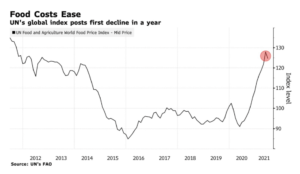Bloomberg's Leah Nylen reported Thursday that "a Colorado judge issued an order temporarily blocking the proposed $25 billion merger of Kroger Co. and Albertsons Cos., which has been challenged by…
Global Food Prices Fall For the First Time in 12 Months
Reuters News reported this week that, “World food prices fell in June for the first time in 12 months, pushed lower by declines in vegetable oils, cereals and dairy products, the United Nations food agency said on Thursday.
“The Rome-based FAO also said in a statement that worldwide cereal harvests would come in at nearly 2.817 billion tonnes in 2021, slightly down on its previous estimate, but still on course to hit an annual record.

“The Food and Agriculture Organization’s food price index, which measures monthly changes for a basket of cereals, oilseeds, dairy products, meat and sugar, averaged 124.6 points last month versus a revised 127.8 in May.
“The May figure was previously given as 127.1.”
The Reuters article noted that, “FAO said the slight fall in its estimate for world cereal production this year was principally triggered by a sharp cut to the Brazilian maize production forecast as prolonged periods of dry weather weighed on yield expectations.”
And Bloomberg writer Megan Durisin reported on Thursday that, “Global food prices fell for the first time in a year, potentially offering some relief for consumers and easing inflationary pressures.

“A United Nations gauge of food costs dropped 2.5% in June, easing from a nine-year high and marking the first decline since May 2020. Prices of vegetable oils and cereals declined during the month, offsetting gains in meat and sugar.”
The Bloomberg article indicated that,
‘I don’t think that we’ll see the impact of this mild decline being felt by consumers given all the other factors that we know are still there,’ Abdolreza Abbassian, a senior economist at the FAO, said by phone.
“World food prices still remain historically high, up about 34% from the same time last year. Crop prices are hinging on the weather in the months ahead to determine whether harvests in Europe and North America will be large enough to replenish strained stockpiles. Much will also depend on China’s imports in the months ahead, Abbassian said, citing a rising outlook for the country’s corn stockpiles.”
Meanwhile, Reuters writer Roberto Samora reported on Thursday that, “Brazil’s grain output should grow to an estimated 333 million tonnes in 10 years’ time, a 27% rise, as farmers expand plantings and demand for the country’s agricultural products holds strong, government research showed.
“In projections released on Wednesday, the agriculture ministry also estimated overall meat production will rise to 34 million tonnes in ten years, up from 27.4 million tonnes now.
“The forecasts suggest the country’s farm economy will continue to boom, competing with the likes of the United States on global agriculture commodities markets to supply large importers, mainly China.”





